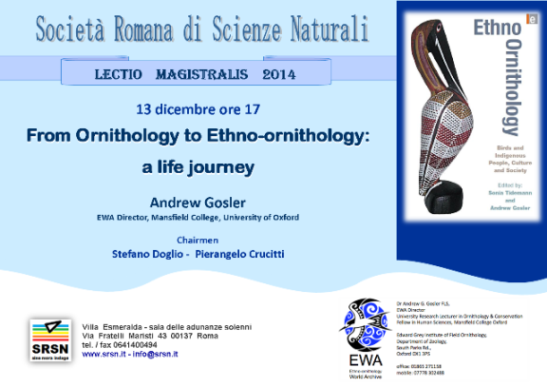Lectio Magistralis 2014
Opening speech by the President
for the conference
FROM ORNITHOLOGY TO ETHNO-ORNITHOLOGY: A LIFE JOURNEY
by Andrew Gosler
Honorable Fellows of the Società Romana di Scienze Naturali, Authorities and Dear Students, Ladies and Gentleman
In my capacity as President of this assembly and as one of the two chairmen, the other one being my dear friend and colleague Stefano Doglio, who's also attending this meeting, it is for me a great honor and a sincere pleasure to introduce, with this short opening speech, the yearly lecture Lectio Magistralis 2014 organized by the Società Romana di Scienze Naturali with the presentation of professor Andrew Graham Gosler, EWA Director, Fellow in Human Sciences and member of Mansfield College of the University of Oxford, authoritative speaker of our meeting. Let us start this conversation with some considerations on the current status and outlooks of Ethno-zoology, the basic discipline of which Ethno-ornithology is one of the most important fields of study and the subject of professor Gosler’s conference. It is of common knowledge that a close connection of dependence and co-dependence between humans and animals throughout history exists. Multiple forms of interactions between local fauna and human represent the core of Ethno-zoology. Historically, Ethno-zoology has grown out of studies undertaken in some academic areas such as zoology, human ecology, sociology and anthropology, thus reflecting the interdisciplinary character of this research area. In tropical regions such as some territories of Meso America and South America, the rich fauna and cultural diversity, with many different species of animals being used for a range of different purposes by Amerindian societies, represent an excellent backdrop to look into these interactions as an integral part of human culture and society. Early naturalists and explorers showed interest in the fauna as well as in the zoological knowledge of native residents; lists of native animals together with their regional names and descriptions of their uses have been compiled. Traditionally, the following sections represent the most important fields in Ethno-zoology: Ethno-entomology, Ethno-ichthyology, Historical Ethno-zoology, Cynegetic activities, Ethno-carcinology, Ethno-ornithology, Ethno-taxonomy, Ethno-mastozoology, Ethno-herpetology, Ethno-malacology, Animal Use and Zootherapy, Magic-religious purposes and cultural symbolisms. Commonly, the first paper on ethno-zoological subjects of a certain region describe the zoological lexicon used by natives. In Italy, too, many historical documents provide descriptions of the local fauna together with the hunting and collecting techniques employed by local natives. The attractive book by Paolo Casanova and Francesco Sorbetti Guerri (2007) “La vita e le cacce dei contadini fra ottocento e novecento. Quando si cacciava per vivere” – “Life and hunting of the countrymen between the nineteenth and twentieth century. When they lived on hunting”, faithfully describes the world of the Italian countrymen at the end of the nineteenth century when poaching (a very common practice in spite of it being illegal) towards birds and mammals such as hares, badgers and other mustelids, foxes and wild boars; with different types of snares and other traps and/or crude hunting rifles; and with the watch and hunting dog as attendants) played a major role for survival among the rural and needy populations of the Apennine. Clearly, the role of geographical factors is of outstanding importance and regional imbalances exist in terms of ethno-zoological inquiries. Professor Gosler’s conversation will be focused on these and many other interesting related problems.
Professor Gosler’s professional curriculum vitae represents a peculiar mingling of research and teaching activities; many books, book chapters and book contributions together with tens of scientific papers and articles which are the results of pure and applied research in over thirty years of his dedication to many topics that he has applied himself to. The academic curriculum vitae is full of important appreciation by the academic community: Director of EWA, the Ethno-ornithology World Archive, University Research Lecturer in Ornithology and Conservation, President of the Oxford Ornithological Society and Fellow of the Linnean Society and of the International Ornithologists’ Union, Head of Institute of Human Sciences of the University of Oxford. In 2012 he received the Union Medal of the British Ornithologists Union. He obtained grants and participated to many teaching activities, organizing courses on Bird Ringing, Biological Conservation, Ecology and Ornithology together with conferences and guest lectures. I am sure that his conference will stimulate attention and participation of our solemn meeting. Professor Gosler, please begin with your conference lecture.
